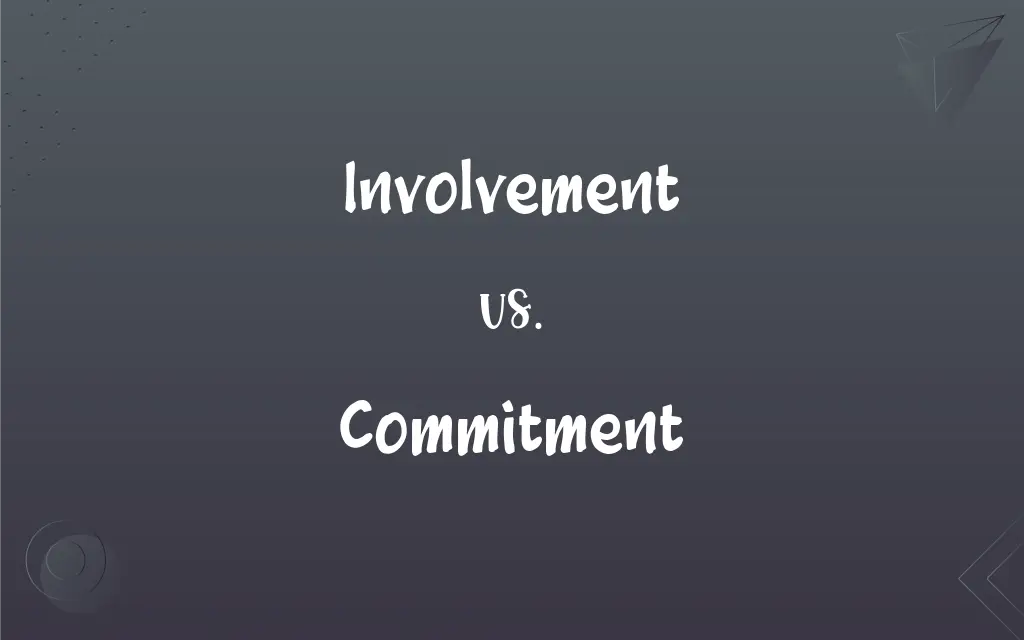Involvement vs. Commitment: What's the Difference?
Edited by Janet White || By Harlon Moss || Updated on November 29, 2023
"Involvement" refers to participation or engagement in something, while "commitment" implies a dedicated pledge or obligation to it.

Key Differences
"Involvement" typically signifies participation or engagement in an activity, process, or situation. It indicates a state of being involved, but not necessarily with a deep sense of obligation. "Commitment," on the other hand, denotes a stronger, more binding pledge or promise to do something, often implying a sense of duty or responsibility.
In the context of relationships or projects, "involvement" can range from casual participation to more significant engagement. It doesn't necessarily mean a long-term dedication. In contrast, "commitment" in these contexts suggests a deliberate decision to remain dedicated, often long-term, and to put in the necessary effort or resources.
"Involvement" can be temporary or fluctuate in intensity, depending on the individual's interest, availability, or motivation. In contrast, "commitment" implies a consistent, ongoing dedication, often regardless of changing circumstances.
"Involvement" can exist without a deep emotional or psychological investment, while "commitment" typically requires a higher level of such investment. Commitment often involves personal values, ethics, or a sense of identity.
In practical terms, "involvement" can be seen in various forms of participation, such as attending meetings, contributing ideas, or taking part in activities. "Commitment" usually requires additional steps such as making promises, setting goals, and following through with consistent actions.
ADVERTISEMENT
Comparison Chart
Definition
Participation or engagement in something
A dedicated pledge or obligation to something
Depth of Engagement
Can vary from minimal to deep
Implies deep, enduring engagement
Duration
Can be temporary or fluctuating
Often long-term and consistent
Emotional Investment
Not necessarily required
Usually involves significant emotional or psychological investment
Practical Expression
Participating, attending, contributing
Making promises, setting goals, following through
ADVERTISEMENT
Involvement and Commitment Definitions
Involvement
Engagement in Activity.
His involvement in the community event made a difference.
Commitment
Pledge to a Cause.
Her commitment to animal rights is admirable.
Involvement
Participation.
Her involvement in the project was limited to providing feedback.
Commitment
Obligation to a Task.
His commitment to completing the project on time was evident.
Involvement
Inclusion in a Process.
Involvement in the planning stage is crucial for success.
Commitment
Adherence to a Principle.
The organization's commitment to transparency is commendable.
Involvement
Connection to a Situation.
The detective doubted the suspect's involvement in the crime.
Commitment
Dedication to a Relationship.
Their commitment to each other was strong.
Involvement
Association with a Cause.
Their involvement in environmental activism is well-known.
Commitment
Promise to Achieve a Goal.
The athlete's commitment to training was unmatched.
Involvement
To have as a necessary feature or consequence; entail
Was told that the job would involve travel.
Commitment
The act of referring a legislative bill to committee.
Involvement
To relate to or affect
The matter is serious because it involves your reputation.
Commitment
Official consignment, as to a prison or mental health facility.
FAQs
Can involvement turn into commitment?
Yes, initial involvement in something can sometimes lead to a deeper commitment.
Does commitment require more effort than involvement?
Generally, commitment requires more effort, as it implies a deeper level of engagement.
Is commitment always voluntary?
Usually, but commitments can also arise from obligations or responsibilities.
Can involvement be passive?
Yes, involvement can be passive, such as being involved by association.
Can someone be involved in something without being committed?
Yes, one can be involved in an activity without being fully committed to it.
Is commitment a decision?
Yes, commitment usually involves a conscious decision to dedicate oneself.
Does commitment imply exclusivity?
In some contexts, like relationships, it can, but not always.
Can someone be committed without being involved?
Not typically; commitment usually implies active involvement.
Is emotional attachment necessary for commitment?
Often, but not always; commitment can also be driven by duty or principle.
Can involvement change over time?
Yes, the level and nature of involvement can fluctuate.
Is commitment a key factor in successful relationships?
Yes, commitment is typically crucial for the success and longevity of relationships.
Can someone be over-involved?
Yes, over-involvement can occur and may lead to burnout or imbalance.
Does commitment imply a moral or ethical stance?
It can, especially when related to principles, values, or beliefs.
Does involvement always lead to a positive outcome?
Not necessarily; involvement can have various outcomes, positive or negative.
Is commitment time-bound?
Commitment can be for a specific duration or open-ended, depending on the context.
Can involvement be a one-time action?
Yes, involvement can be a singular act or participation in a specific event.
Can involvement exist in a professional context without commitment?
Yes, professionals can be involved in projects without being fully committed to them.
Does commitment affect personal identity?
Yes, commitment, especially to significant causes or relationships, can shape one's identity.
Can involvement be informal?
Yes, involvement can be informal or formal, depending on the setting and nature of the activity.
Can involvement be measured?
Involvement can be measured in terms of participation level, time spent, or contribution.
About Author
Written by
Harlon MossHarlon is a seasoned quality moderator and accomplished content writer for Difference Wiki. An alumnus of the prestigious University of California, he earned his degree in Computer Science. Leveraging his academic background, Harlon brings a meticulous and informed perspective to his work, ensuring content accuracy and excellence.
Edited by
Janet WhiteJanet White has been an esteemed writer and blogger for Difference Wiki. Holding a Master's degree in Science and Medical Journalism from the prestigious Boston University, she has consistently demonstrated her expertise and passion for her field. When she's not immersed in her work, Janet relishes her time exercising, delving into a good book, and cherishing moments with friends and family.
































































